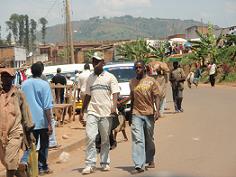Burundi: Power Sharing Effective in Preventing Ethnic Conflicts
2010.11.24
As the world has experienced many conflicts and wars throughout history, Rwanda and Burundi in Central Africa have also been the stage of violent clashes between two ethnic groups, "Tutsi" and "Hutu” in the 20th century. In order to gain an understanding of the post-conflict situation and explore what political institutions are effective in preventing conflict, JICA-RI Senior Research Fellow Shinichi Takeuchi flew to Burundi for a field survey from Oct. 25 - Nov. 16, 2010.
Comparative Study of Burundi and Rwanda
In neighboring Burundi and Rwanda, conflicts attributing to ethnicity intensified in the late 20th century, leading to catastrophic fightings resulting in a total of over 1 million deaths and 2 million refugees. Although the security situation now seems to be relatively stable in both countries, the contrasts in their political institutions are striking. In Rwanda, the Tutsi-led Rwandan Patriotic Front (RPF), which was the victor of the civil war, has controlled power. Meanwhile Burundi established a Constitution in 2005 that included articles for "power sharing" by determining the allocation ratio of political positions by ethnic group (see table). Conducted five years after the constitution became effective, this field survey is to analyze the effectiveness of the power sharing through interviews of local residents. It’s part of JICA RI's research project “Prevention of Violent Conflicts in Africa,” and aims to seek prevention measures for conflict through a unique case study of Burundi.
In the field survey, Takeuchi interviewed more than 40 people, among them the Chief Secretary of the First Vice President's Office, the Deputy Chief Secretary of the Second Vice President's Office, the President of Hutu-led "Front for Democracy in Burundi (FRODEBU)," the President of Tutsi-led "Union for National Progress (UPRONA)," chiefs of regional collines (the smallest administrative units), and officials from international organizations.
What first became clear in the survey was every interviewee’s favorable reaction to the power sharing policy. Further analyses revealed an interesting picture.
As a positive effect, a shift in the nature of political disputes was observed among the elite class. "Ethnicity is becoming less of an important factor in Burundian elite politics," Takeuchi says. "It’s no longer a plain question of Tutsi or Hutu." The diminishing role of ethnicity in elite politics holds a significant meaning in the context of conflict prevention. Various factors lead to conflict, but those arising from ethnicity hold a powerful mobilizing force, and are dangerous because of it, as seen in the tragedies of Burundi and Rwanda. And in many cases, it is the political elite that mobilize the people.

A typical Burundian town: Hutus and Tutsis live next to each other
Leading Party Building Power Regardless of Power Sharing Policies
Meanwhile, the survey revealed there are also limitations in power sharing policies. Takeuchi points out the strong tendency of the ruling party "National Council for the Defense of Democracy – Forces for the Defense of Democracy (CNDD-FDD)" to control the state institutions under the power sharing framework by occupying key positions. Recently, critics have indicated the general population is starting to voice despair and anger towards the government, due to corruption and repression caused by monopolization of power. This led the "Forces for National Liberation (FNL)," a Hutu-led group like the CNDD-FDD, to resort to violence and heightened tension with CNDD-FDD. The situation has become rather serious and FNL and several other political parties boycotted the string of elections held in 2010 by refusing to register candidates. The rivalry between FNL and CNDD-FDD has replaced ethnicity to become a new root of conflict.
Power sharing has not been as effective for the issues such as “weak governance" and "low standard of living." In an attempt to strengthen its support base, CNDD-FDD laid out policies such as free health care and education to gain trust of the local population. “But due to financial problems, it’s unclear as to how long such ‘pork-barrel policies’ can be continued. As for the living standard of the common people, a key element in preventing conflict would be poverty reduction. Previous studies have shown how people tend to move towards conflict when they have less to lose,” explains Takeuchi.
The Returning of 500,000 Hutu Refugees
The biggest concern now is land issues. In the civil war of 1972, an estimated 200,000 Hutus were killed in the massacre, and 500,000 more fled the country as refugees. Hutus have gradually begun to return after the inauguration of the new regime, but the land they left behind over 30 years ago are mostly occupied by other people, including many Tutsis. But Tutsis were also victimized by Hutus in the civil war of 1993. Tutsis that were chased from their villages still live in camps for internally displaced persons. With land so limited, the question is how peasants can compromise peacefully. There’s still a risk that this problem might take on an ethnic character and trigger conflict.

A monument in the center of the capital, Bujumbura. Right: Former President Ndadaye, Left: Prince Rwagasore who led Burundi's independence movement. Both were assassinated in past conflicts.

Tutsi camps for internally displaced persons
From these observations, Takeuchi concludes, "In Burundi, issues rooting from ethnicity are not yet completely resolved, but through the institutionalization of a power sharing system, the situation seems to settle down among the elite level. The fear that ethnicity might be used as a mobilizing tool in the elite-class power struggle was subsided for now.”
RELATED RESEARCH AREA:Peace and Development
RELATED RESEARCH PROJECT:Prevention of Violent Conflicts in Africa

事業事前評価表(地球規模課題対応国際科学技術協力(SATREPS)).国際協力機構 地球環境部 . 防災第一チーム. 1.案件名.国 名: フィリピン共和国.

事業事前評価表(地球規模課題対応国際科学技術協力(SATREPS)).国際協力機構 地球環境部 . 防災第一チーム. 1.案件名.国 名: フィリピン共和国.

事業事前評価表(地球規模課題対応国際科学技術協力(SATREPS)).国際協力機構 地球環境部 . 防災第一チーム. 1.案件名.国 名: フィリピン共和国.

事業事前評価表(地球規模課題対応国際科学技術協力(SATREPS)).国際協力機構 地球環境部 . 防災第一チーム. 1.案件名.国 名: フィリピン共和国.

事業事前評価表(地球規模課題対応国際科学技術協力(SATREPS)).国際協力機構 地球環境部 . 防災第一チーム. 1.案件名.国 名: フィリピン共和国.
scroll